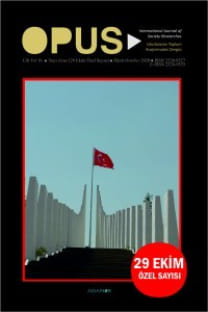Öğretmenlerin Yansıtıcı Düşünme Becerilerinin Çeşitli Değişkenlere Göre İncelenmesi
Öğretmenler, Yansıtıcı düşünme, Yansıtıcı öğretmen, Karar ağacı
Analyzing Teachers’ Reflective Thinking in terms of Some Variables
Teachers, Reflective thinking, Reflective teacher, Decision tree.,
___
- Akbaş, A., Çelikkaleli, Ö. (2006). Sınıf öğretmeni adaylarının fen öğretimi özyeterlik inançlarının cinsiyet, öğrenim türü ve üniversitelerine göre incelenmesi. Mersin Üniversitesi Eğitim Fakültesi Dergisi, 2(1), 98-110.
- Alp, S. ve Şahin. T, Ç. (2008). Eğitimde yansıtıcı düşüncenin önemi ve yansıtıcı düşünceyi geliştirme, Milli Eğitim Dergisi, 178, 311–320.
- Arztz, A.F. ve Armour-Thomas, E. (2001). Becoming a reflective mathematics teacher: A guide for observations and self-assessment. Mahwah, NJ: Lawrence ErlbaumAssociates.
- Aslan, G. (2009). Sınıf öğretmenlerinin yansıtıcı düşünme eğilimleri ile sürekli kaygı düzeyleri arasındaki ilişkinin incelenmesi. Yayınlanmamış Yüksek Lisans Tezi. Yeditepe Üniversitesi Sosyal Bilimler Enstitüsü. İstanbul.
- Atay, Y. D. (2003). Öğretmen eğitiminin değişen yüzü (1. Bsm). Ankara: Nobel Dağıtım.
- Ayers, W. (2001). To teach: The journey of a teacher (2nd ed.),New York: Teachers College.
- Bölükbaş, F. (2004). Yansıtıcı öğretimin ilköğretim ikinci kademe öğrencilerinin türkçe dersine yönelik tutum ve başarıları üzerindeki etkililiği. Yayımlanmamış Doktora Tezi. Dokuz Eylül Üniversitesi Eğitim Bilimleri Enstitüsü, İzmir.
- Danielson, C. (1996). Enhancing professional practice: A framework for teaching. (2nd ed.). Alexandria, VA: ASCD.
- Demiralp, D. (2010). İlköğretim birinci kademe programlarının öğrencilerin yansıtıcı düşünmelerini geliştirmeye etkisine yönelik öğretmen görüşleri Elazığ ili örneği. Yayınlanmamış Yüksek Lisans Tezi. Fırat Üniversitesi Soysal Bilimler Enstitüsü, Elazığ.
- Dewey, J. (1933). How we think: A restatement of the relation of reflective thinking to the educative process. Boston: D. C. Heath.
- Dilekli, Y. (2015). Öğretmenlerin düşünmeyi öğretmeye yönelik yaptıkları sınıf içi uygulamalar:Özyeterlik düzeyleri ve öğretim stilleri arasındaki ilişki. Yayınlanmamış Doktora Tezi. Sosyal Bilimler Enstitüsü, Balıkesir Üniversitesi, Balıkesir.
- Dilekli, Y. (2018). Üst düzey düşünme becerileri , Öğretim İlke ve Yöntemleri, içinde (319-356), Ankara: Maya.
- Doğan-Dolapçıoğlu, S. (2007). Sınıf öğretmenlerinin yansıtıcı düşünme düzeylerinin değerlendirilmesi. Yayınlanmamış Yüksek Lisans Tezi. Mustafa Kemal Üniversitesi Sosyal Bilimler Enstitüsü, Hatay.
- Donald, R., Deborah, B., J. ve Kim, K. M. (2006).The act of teaching, New York: McGrawHill.
- Durdukoca, Ğ. ve Demir, M. (2012). İlköğretim öğretmenlerin bazı değişkenlere göre yansıtıcı düşünme düzeyleri ve düşüncelerindeki öğretmen niteliklerinin yansıtıcı öğretmen niteliklerine uygunluğu. Mustafa Kemal Üniversitesi Sosyal Bilimler Enstitüsü Dergisi, 20, 357-374.
- Durdukoca, Ş. F. ve Demir, M. (2012). İlköğretim öğretmenlerin bazı değişkenlere göre yansıtıcı düşünme düzeyleri ve düşüncelerindeki öğretmen niteliklerinin yansıtıcı öğretmen niteliklerine uygunluğu. Mustafa Kemal Üniversitesi Sosyal Bilimler Enstitüsü Dergisi, 9(20), 357-374.
- Gelter, H. (2003). Why is reflective thinking uncommon. Reflective Practice 4 (3), 337-345.
- Güney, K. (2008). Mikro-yansıtıcı öğretim yönteminin öğretmen adaylarının sunu performansı ve yansıtıcı düşünmesine etkisi. Yayımlanmamış Doktora Tezi. Fırat Üniversitesi Sosyal Bilimler Enstitüsü, Elazığ.
- Harrison, J., Dymoke, S. ve Pell, T. (2006). Mentoringbeginning teachers in secondaryschools: An analysis of practice. Teaching and Teacher Education, 22, 1055–67.
- Hasırcı, Ö.K. ve Sadık, F. (2011). Sınıf öğretmenlerinin yansıtıcı düşünme eğilimlerinin incelenmesi. Çukurova Üniversitesi Sosyal Bilimler Enstitüsü Dergisi, 20(2), 195-210.
- Husu, J., Patrikainen, S. ve Toom, A. (2006). Examining student teachers’ practicum portfolios to develop reflective competencies in teaching.Paper presented in AERA 2006 Annual Conference in San Francisco.
- İnönü, Y. (2006). Tarih öğretmenlerinin yansıtıcı öğretmen özelliklerine sahiplik düzeyi: Van örneği. Yayınlanmamış Yüksek Lisans Tezi. Yüzüncü Yıl Üniversitesi Sosyal Bilimler Enstitüsü, Van.
- Kaf, H. Ö. ve Sadik, F. (2011). Sınıf öğretmenlerinin yansıtıcı düşünme eğilimlerinin incelenmesi, Çukurova Üniversitesi Sosyal Bilimler Dergisi, 20, 195-210.
- Karasar, N. (2011). Bilimsel araştırma yöntemi. (22.Bsm). Ankara: Nobel Akademi.
- Kızılkaya, G. ve Aşkar, P. (2009). Problem çözmeye yönelik düşünme becerisi ölçeğinin geliştirilmesi. Eğitim ve Bilim, 34(154), 82-92.
- Kuzu, S. (2011). Fen bilgisi öğretmenlerinin yansıtıcı düşünmeye ilişkin görüşlerinin değerlendirilmesi:Şırnak ili örneği. Yayınlanmamış Yüksek Lisans Tezi, Dicle Üniversitesi Sosyal Bilimler Enstitüsü, Diyarbakır.
- Lee, J. H. (2005). Understanding and assessing preservice teachers’ reflective thinking. Teaching and Teacher Education, 21(6), 699-715. https://doi.org/10.1016/j.tate.2005.05.007
- Loughran, J. J. (1996). Developing reflective practice: Learning about teaching and learning through modelling. London: Falmer.
- Mahnaz, M. (1997). Content and nature of reflective teaching: A case of an experiment middle school science teacher. Clearing House, 70(3), 143-151.
- Mayes, C. (2001). A transpersonal model for teacher reflectivity. Journal of Curriculum Studies, 33(4), 477–493.
- Oser, F., Dick, A. ve Paltry, J. (1992). Effective and Responsible Teaching. San Francisco, CA: Jossey-Bass.
- Semerci, Ç. (2007). Öğretmen ve öğretmen adayları için yansıtıcı düşünme eğilimi (YANDE) ölçeğinin geliştirilmesi, Kuram ve Uygulamada Eğitim Bilimleri, 7(3), 1351-1377.
- Swain, S.S. (1998). Studying teachers’ transformations: Reflections as methodology. The Clearing House, 72(1), 28–34.
- Tripp, D. (2003). Action inquiry, action research reports, 04.02.2018 tarihinde www.fhs.usyd.edu.au/arow/arer/017.htm adresinden erişildi.
- Willard-Holt, C. ve Bottomley, D. (2000). Reflectivity and effectiveness of preservice teachers in a unique field experience. Action in Teacher Education 21(2), 76-89.
- Wilson J., & Jan W.L. (1993). Thinking for themselves: Developing strategies for reflective learning. Australia: Eleanor Curtain Publishing.
- ISSN: 2528-9527
- Yayın Aralığı: 12
- Yayıncı: ADAMOR Toplum Araştırmaları Merkezi
Öğretmenlerin Yansıtıcı Düşünme Becerilerinin Çeşitli Değişkenlere Göre İncelenmesi
Milliyetçiliğin İnşası ve Sinema: Fetih 1453 Filmi Örneği
Ergenlerin Sanal Zorbalık Düzeylerinin Bazı Değişkenler Açısından İncelenmesi
Serhat ARSLAN, Ferahim YEŞİLYURT
Türk Modernleşmesinin Kadın-Asker Sembolü Sabiha Gökçen Üzerine Bir Değerlendirme
Demokrat Parti Dönemi Kars’ta Sağlık Hizmetlerinde Yaşanan Gelişmeler
Sami Sonat ÖZDEMİR, Düriye BOZOK
Suriyeli Sığınmacıların Türkiye’ye Göç Sonrası Yaşadığı Sorunlar: İstanbul Örneği
Güler GÜNEŞ ASLAN, Fethi GÜNGÖR
Ev Ödevleri: Öğretmen, Öğrenci ve Veli Görüşleri
Halkla İlişkiler Mesleğinin Toplumdaki Algısı: Elazığ İli Örneği
